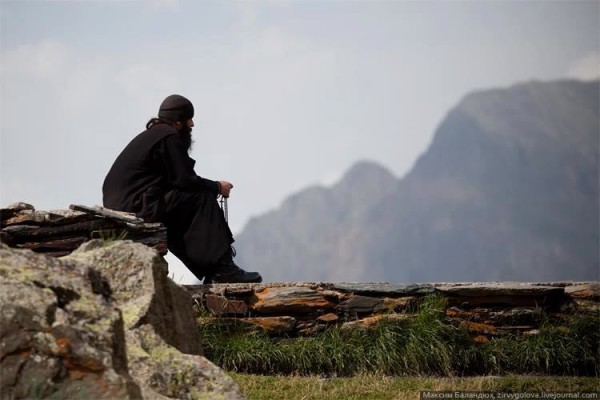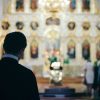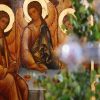He was a young man about twenty, working in the big city. Handsome in appearance and elegant in gait and manners, he was prone to give the wrong impression to those who judged by outward looks. His job placed him near the power brokers of his day. A quick mind and swift tongue guaranteed him a bright future. Religion did not much interest him. He saw it as a preoccupation with old customs and ceremonies. Religion was what other people did. The words of the Bible, as far as he heard them sometimes, did not apply to the suit and grit of daily life.
But one day he came across the path of a holy monk. This saintly elder, who shone with humble holiness, had come to Constantinople to visit with his spiritual children. To be near such a man was to feel God’s presence. The love and kindness shining forth from this living saint stirred something deep in the young man who never thought that such people existed in the world. He was eager to arrange to see the holy elder. He wanted to hear words of advice and, if possible, a way to find forgiveness of sins and freedom from guilt that nagged at him from within his soul.
Although the elder welcomed him, he did not have much to say. He was warm and loving, but his words were few. He gave the youth a simple rule of prayer for the evenings—to read a few psalms from the Bible and to offer some prayers to God and to the Virgin Mary. He was told that what was important was not the exact number or kinds of prayer but just praying from the heart and praying regularly, putting one’s trust in God.
Upon asking, the young man was also given a book on spiritual life which he read with uncommon attention. From this book, the young man chose to follow three rules: (1) if you seek spiritual healing, be attentive to your conscience, do what it says, and you will find benefit; (2) whoever desires the blessing of the inner awareness of the grace of the Holy Spirit must first live diligently by God’s commandments; and (3) when you come to prayer, come as one who is blind and ask for spiritual light to know Christ as Lord.
The young man, as he reports, continued to work in the city. He did not change jobs. He did not wear different clothes, or comb his hair in a different way, or walk differently. Outwardly he was in the world the same way as before but said nothing of his new interests. Inwardly, however, hints of an amazing new world began to stir to life. He followed the simple program advised by the elder and carefully observed the three rules he had set from the book he read. Sometimes his conscience would tell him to add psalms and to continue humbly repeating “Lord, have mercy,” which he did. Soon, out of a sense of deep repentance, tears of contrition began to run down his cheeks. He prayed all the more fervently to God, to the Virgin Mary, and to her son, Christ, just as if Christ was present and in front of him, holding to His feet, and praying as a blind man to find, if possible, mercy and spiritual sight.
One evening, as the young man stood straight and prayed within him the publican’s prayer, “O God, have mercy upon me a sinner” (Luke 18:13), a wondrous and unexpected visitation from God overwhelmed him. A divine radiance suddenly filled the room. Amazed and not knowing what was happening, the young man forgot where he was. He saw light everywhere. He did not know whether his feet still touched the ground or whether he was lifted up in the air, but had no fear of falling. He himself, so it seemed, became radiant with light, wholly forgetting the world, and filled unspeakable joy. Then the visitation passed. Still filled with awe and joy, the young man finished his prayers and got up to go to work the next day with virtually no sleep that night. The wonder and sweetness of the vision lasted for days and became the touchstone of his life.
Many years later, the same young man now grown older and having become a monastic, confided the story to others and wrote about it for the benefit of seekers after God. One of the lessons he drew from it was about the power of faith. He wanted to teach that everyone, young or old, and in whatever conditions in life, could come to know God personally and directly, and rejoice in a new spiritual birth. If he, as a full-blooded young man, living in the world and engaged in ordinary affairs and distractions, could come to hear God’s call and be blessed with God’s personal presence, so could anyone else who was willing to give her or his heart to God. He practiced neither years of fasting nor long vigils, but merely some simple prayers and observed a few essential spiritual principles. Yet, he was blessed with a vision such as one would read in the Bible or the lives of great saints. It was a pure gift. He was not seeking a vision, nor should anyone proudly seek such, but only forgiveness of his sins and assurance of God’s presence.
“Do you hear, my brothers,” he would say to his listeners years later, “what things faith in God can do, when it is accompanied by actions?” What is critical is not youth or old age, education or lack of it, work or leisure, married or single life, but sincere faith by which a person gives heart and soul to God and commits unreservedly to follow God’s ways. It is faith, he would say, along with inner desire and free will, elements that God has placed in every heart, that make a person draw near to God and receive His life-changing blessings. It is faith, confirmed by prayer, spiritual reading, and good works, that fires up the soul with zeal for God and unending love for Him.
The young man grew and matured, becoming a teacher and spiritual father to many seekers. Not long after his death, the Church proclaimed him a saint. Yet his spiritual odyssey was not without dramatic ups and downs. With shocking candor, he hints about terrible falls after his first sublime vision–falls which led him to carnal sins and spiritual blindness worse than ever. His own struggles and recovery taught him that true life with God is always a gift, not a possession. As a gift, it must always be guarded and nurtured with utmost vigilance and care. It is impossible, he taught, that she or he who seeks with all his soul should fail to find Christ and His blessings. When falling to sin, rise up bravely, repent immediately, cry out to God for forgiveness, and continue the right path. To one who faithfully knocks, the Lord opens the gates of His kingdom, and to the one who asks for bread, He gives the Holy Spirit. This is our destiny in life: We are created for God, to know Him, to rejoice in Him, to serve Him, and through faith, gratitude, and love, to be blessed by Him with greater gifts at the end of life’s journey.
[The above story is a true story derived from the life of St. Symeon the New Theologian (ca. 960-1022 AD] and gleaned especially from his Catechetical Discourse 22).

















